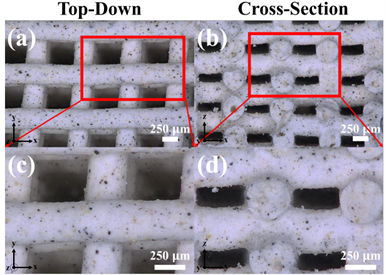Antibacterial Silicate Glass-Ceramic Filament for 3D Printing Bone Materials
Case ID:
TEC2020-0106
Web Published:
6/14/2021

INTRODUCTION
The use of 3D printed porous scaffolds provides a multi-dimensional template that closely mimics the native structure of bone. This is beneficial for creating ideal conditions for bone tissue regeneration. Silicate bioactive glass-ceramics are inherently bioconductive and bioinductive, making them ideal for tissue regeneration.
DESCRIPTION OF TECHNOLOGY
The inventors have fabricated 3D printed silicate bioactive and antibacterial silver-doped glass-ceramic (Ag-BG) scaffolds using a fused filament fabrication (FFF) additive manufacturing technique. The thermal debinding and sintering processes minimize the structural deformation of the Ag-BG scaffolds and the compressive strength of these Ag-BG scaffolds is in the range of cancellous bone. The inventors have shown that the 3D printed scaffolds also have bioactive behavior and anti-methicillin resistant Staphylococcus aureus (MRSA) activity.
BENEFITS
- Promotes bone tissue growth. Suitable for load bearing applications
- Anti-MRSA activity
APPLICATIONS
- Prosthetics and Orthopedics
- Bone tissue engineering
PATENT STATUS
Patent pending. Published application US 2020/0330510 A1
LICENSING RIGHTS
Full licensing rights available
INVENTORS
Dr. Xanthippi Chatzistavrou, Dr. Aljoscha Roch
TECH ID
TEC2020-0106
Patent Information:
| App Type |
Country |
Serial No. |
Patent No. |
File Date |
Issued Date |
Expire Date |
For Information, Contact:
Jon Debling
Technology Manager
Michigan State University
deblingj@msu.edu